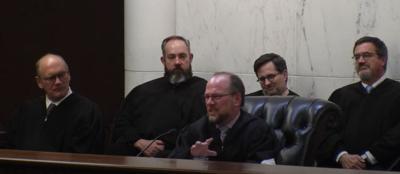Colorado's second-highest court clarified for the first time last week that a witness who testifies in a civil case, but who dies before a related criminal case goes to trial, may have their testimony used in the criminal proceedings. A three-judge Court of Appeals panel concluded that if the criminal defendant had a "full, fair, and motivated opportunity" to question the witness prior to death, there is no constitutional or evidentiary violation from letting jurors hear the statements. In a case out of Delta County, William Henry Harmon hired a construction company to make a steel building on his property.
The parties eventually got into a dispute and word reached the company's owners that Harmon had threatened to kill one of them, Paul Hershberger. Hershberger terminated the contract as a result, with a partial refund. Harmon sued for breach of contract and Hershberger countersued, arguing the death threat made fulfillment of the business arrangement impossible.

District Court Judge Steven L. Schultz presided over a 2018 trial in which both men testified, ruling that both sides were at fault. After Schultz's ruling, Harmon engaged in stalking behavior against Herschberger and his wife.
After Harmon sat in his truck outside Herschberger's home and drove away, law enforcement officers responded to the report by pulling Harmon over. Based on statements he made to a sheriff's deputy, his apparent intoxication and evidence suggesting Harmon was actually prepared to shoot Herschberger, law enforcement arrested him. In addition to driving under the influence, prosecutors charged him with stalking and attempted murder.
Jurors convicted Harmon and he received a sentence of 10 years in community corrections. Harmon raised several arguments on appeal, including that Schultz — who presided over both the civil and criminal trials — mistakenly admitted Herschberger's testimony from the civil proceeding into the criminal one. Before Harmon's criminal trial, Herschberger died in an unrelated accident.
In evaluating whether Herschberger's civil trial testimony should, therefore, be used in Harmon's criminal proceedings, Schultz noted no Colorado court case had ever addressed the precise issue. But generally, Colorado courts allow for an unavailable witness's hearsay testimony — meaning statements made outside of court and used to prove the truth — if the accused had an opportunity to cross-examine the witness at the time. "Mr.
Hershberger was subject to unfettered cross-examination during his testimony, including challenges as to his credibility and his factual assertions. There was no restriction whatsoever imposed on Mr. Harmon’s attorney, who did, in fact, address the contractual relationship between the parties, as well as the threats made by his client as part of his cross-exam," Schultz wrote.
He concluded that letting jurors hear Herschberger's prior testimony did not violate Harmon's constitutional right to confront the witnesses against him. Harmon contended on appeal that the civil case and the criminal case were too distinct for the hearsay testimony to be admitted. The "stakes are infinitely less important" in a civil case, wrote public defender Emily Hessler, and Harmon's motivation to cross-examine Herschberger civilly "could not equal his motive to do so at an attempted murder prosecution.
" The Court of Appeals panel, however, agreed with Shultz's reasoning. Decided: April 10, 2025 Jurisdiction: Delta County Ruling: 3-0 Judges: Timothy J. Schutz (author) Craig R.
Welling W. Eric Kuhn "Harmon seems to be suggesting that we should hold that testimony from a prior civil case can never be admitted in a criminal case," wrote Judge Timothy J. Schutz in the April 10 opinion.
"But Harmon cites no authority, and we are aware of none, adopting such a broad rule." He wrote that the focus should be on whether Harmon had "a full, fair, and motivated opportunity to examine" Herschberger during the civil trial. Given that Harmon's original death threat was a key component of the civil trial, "it begs credulity to suggest that his counsel was not substantially motivated to fully plumb Paul’s testimony about the 2015 death threat," Schutz added.
The panel also rejected Harmon's argument that Schultz, the trial judge, should have recused himself from the criminal case because he "created evidence" during the civil trial by questioning the witnesses. The Court of Appeals noted the parties never asked Schultz to recuse and there was no evidence Schultz was biased. The case is People v.
Harmon..
Politics

Appeals court rules dead witness's prior testimony may be used in criminal case

Colorado's second-highest court clarified for the first time last week that a witness who testifies in a civil case, but who dies before a related criminal case goes to trial, may have their testimony used in the criminal proceedings.















